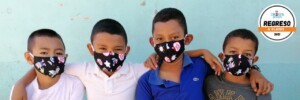By Norris Burkes April 11 2021
Think about that moment in childhood when a scary noise sends you diving under your bed cover. Then, with trembling hands, you shine a flashlight into the room and find renewed confidence to venture out.
That’s how I feel as my wife Becky and I board a plane to Honduras to visit our newest grand-baby. Fully vaccinated, we are finally busting out of this quarantine.
My regular readers recognize Honduras as the place we go to support Chispa Project. The charity was founded by my daughter Sara in 2015 to establish elementary school libraries.
Now, on final approach into Tegucigalpa, the capitol city, I see the scarring impact of the two hurricanes that broadsided this country last year. In a region still recovering from the 11,000 fatalities caused by 1998 Hurricane Mitch, these new storms bring a double whammy into the pandemic year.
A few minutes later, the topography forces our plane to assume a steep angle toward one of the most challenging runways in the world for commercial aircraft. The braking force is so forceful that people applaud our stop.
We disembark from the plane and find Sara curbside. She drives us through the capitol city to see firsthand how the Honduran people are coping with the pandemic.
My daughter narrates the early days of the pandemic when armed guards at checkpoints blocked those from family businesses heavily dependent on transportation.
Supplies and workers dwindled, inventories were lost, and proud families relied on handouts. Without the vaccine, my daughter tells me, the people have precious little hope.
Nevertheless Hondurans are pushing back with everything they know to do. Businesses open with common precautions because the alternative is starvation. They wear masks everywhere — while on motorcycles, walking the road, or staying indoors under three layers of masks. They wear them because, for now, that’s all the hope they have.
Two million school children still remain at home without laptops or internet. So many children depend on homework given through teacher text messages. Often the texts are only exercises in copying skills.
School here was supposed to start March 1, but without vaccines, teachers battle parents over the safety of reopening.
“The extraordinary circumstances have led to extraordinary costs,” says Chispa Project Director Sara Brakhane. “It’s become unaffordable for parents and teachers to keep their kids in school. Families can’t afford the one dollar a week in paper copies or prepaid phone data cards they need to do the homework.
“Yet we are determined” adds Brakhane,” to help schools through this crisis on an extraordinary basis, despite it being out of our normal practices of donation.”
Now Chispa Project is joining local efforts to help parents put their kids back in school by launching “Back for a Buck.”
The slogan gives a clearer picture to the cost, that only one dollar can send a kid back to school. Just one dollar buys a reusable mask for a student and also give jobs to local women. One dollar will purchase school supplies. One dollar helps parent volunteers send a library book home in a protected packet.
As the vaccine becomes widely available in the U.S. and the hope of normalcy becomes more realistic, it is easy to forget that this hope is not a global one. The complications of COVID are expounded in low-income countries like Honduras, where 2 out of 3 people live off less than $2.50 a day.
That’s why a buck can make such a difference, providing hope for these students to come out from under the blanket of fear that COVID has created.
The vaccine allows my wife and me to bask in our grandson’s laughter and feel the hope of new life. That’s why my family will pledge to match every donation from readers this year up to $5,000. Buck for buck, let’s band together to blanket Honduras with hope and send kids back to school.
Donate at chispaproject.org/thechaplain or send check to “Norris Burkes” 10566 Combie Rd. Suite 6643 Auburn, CA 95602
—————————————————
Visit www.thechaplain.net or https://www.facebook.com/theChaplainNorris. Send comments to comment@thechaplain.net or via voicemail (843) 608-9715. Twitter @chaplain.





